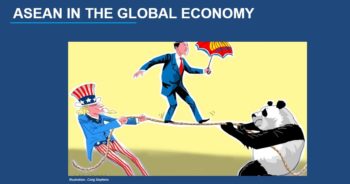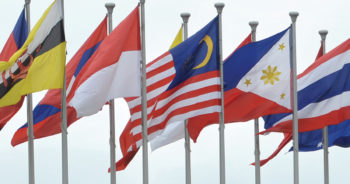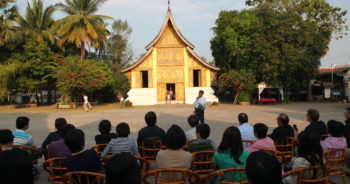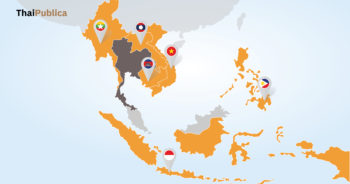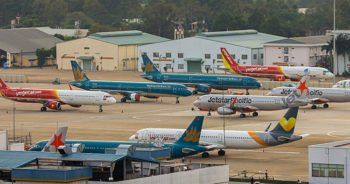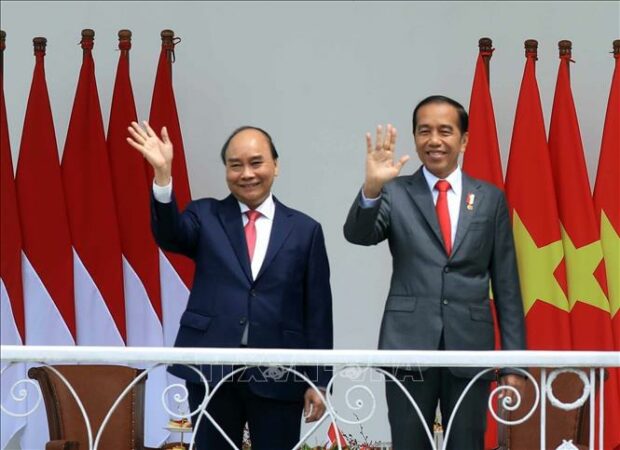
นายเหวียน ซวน ฟุก ประธานาธิบดีแห่งสาธารณรัฐสังคมนิยมเวียดนาม เยือนอินโดนีเซียอย่างเป็นทางการระหว่างวันที่ 21-23 ธันวาคม ตามคำเชิญของประธานาธิบดีโจโก วิโดโด ของอินโดนีเซีย การเยือนครั้งนี้คาดว่าจะเป็นก้าวสำคัญครั้งใหม่ที่มีส่วนช่วยส่งเสริมความสัมพันธ์เก่าแก่และมีเอกลักษณ์ระหว่างทั้งสองประเทศ
นับตั้งแต่เวียดนามและอินโดนีเซียสถาปนาความสัมพันธ์ทางการทูตในเดือนธันวาคม พ.ศ. 2498 มิตรภาพทวิภาคีที่สืบเนื่องยาวนานได้ถูกสร้างขึ้นบนรากฐานที่มั่นคงซึ่งวางไว้โดยประธานาธิบดีโฮ จิ มินห์และประธานาธิบดีซูการ์โน และพัฒนาโดยผู้นำรุ่นต่อๆมา และประชาชนของทั้งสองประเทศ การจัดตั้งหุ้นส่วนทางยุทธศาสตร์ระหว่างเวียดนามและอินโดนีเซียในปี 2556 นับเป็นก้าวสำคัญของความสัมพันธ์ทวิภาคี สร้างโอกาสให้ทั้งสองประเทศดำเนินการส่งเสริมความสัมพันธ์ทวิภาคีเพื่อพัฒนาและให้แน่นแฟ้นยิ่งขึ้นในทุกด้าน โดยเฉพาะด้านการเมือง เศรษฐกิจ วัฒนธรรม การศึกษา-ฝึกอบรม และการป้องกัน
แม้ประสบความยากลำบากจากการแพร่ระบาดของโควิด-19 แต่ความสัมพันธ์ทางการค้าระหว่างเวียดนามและอินโดนีเซียได้พัฒนาอย่างรวดเร็วและมีมูลค่าถึง 1.14 หมื่นล้านดอลลาร์สหรัฐ เพิ่มขึ้น 40% เมื่อเทียบเป็นรายปี และเกินเป้าหมาย 10 พันล้านดอลลาร์สหรัฐที่ทั้งสองประเทศ กำหนดไว้ในโครงการปฏิบัติการเพื่อดำเนินการ ความร่วมมือเชิงกลยุทธ์ของทั้งสองประเทศสำหรับปี 2562-2566
ปัจจุบัน เวียดนามเป็นหนึ่งในคู่ค้ารายใหญ่ที่สุดของอินโดนีเซีย ในขณะเดียวกัน อินโดนีเซียเป็นคู่ค้ารายใหญ่อันดับ 12 ของเวียดนามในปี 2564 เมื่อเร็วๆ นี้ ทั้งสองประเทศตั้งเป้าเพิ่มมูลค่าการค้าทวิภาคีเป็น 1.5 หมื่นล้านดอลลาร์สหรัฐภายในปี 2571 และมีศักยภาพสูงที่จะบรรลุเป้าหมายนี้
รัฐบาลทั้งสองประเทศเห็นพ้องที่จะเร่งสรุปแผนปฏิบัติการสำหรับปี 2567-2561 เพื่อเป็นแนวทางสำหรับความร่วมมือทวิภาคีในอนาคตเพื่อเสริมสร้างความเป็นหุ้นส่วนให้แน่นแฟ้นยิ่งขึ้น
อินโดนีเซียและเวียดนามยังเห็นพ้องที่จะส่งเสริมการแลกเปลี่ยนคณะผู้แทนและการติดต่อในทุกระดับ ลดอุปสรรคทางการค้าและการลงทุน การลงนามในบันทึกความเข้าใจ (MOU) ว่าด้วยความร่วมมือด้านข้าวทวิภาคีในช่วง 4 ปีข้างหน้า ขจัดอุปสรรคเพื่อสร้างเงื่อนไขที่เอื้ออำนวยต่อความร่วมมือในสาขาการประมง เทคโนโลยีขั้นสูง และเศรษฐกิจดิจิทัล
ทั้งสองประเทศกำลังมองหาความร่วมมือในด้านต่างๆ เช่น การเกษตร การประมง พลังงาน การบิน วัฒนธรรม การศึกษา-การฝึกอบรม การท่องเที่ยว และระบบนิเวศของรถยนต์ไฟฟ้า
นอกจากข้อตกลงทวิภาคีที่ลงนามระหว่างเวียดนามและอินโดนีเซียแล้ว การลงนามในข้อตกลงการค้าฉบับประวัติศาสตร์ ความตกลงหุ้นส่วนทางเศรษฐกิจระดับภูมิภาค (RCEP) ระหว่างการเป็นประธานอาเซียนของเวียดนามในเดือนพฤศจิกายน 2563 ที่กรุงฮานอย ยังทำให้ทั้งสองประเทศมีโอกาสมากขึ้นในการกระชับความร่วมมือทางเศรษฐกิจระดับทวิภาคี
RCEP ซึ่งเป็นข้อตกลงการค้าเสรีที่ใหญ่ที่สุดในเอเชียแปซิฟิกลงนามโดยอินโดนีเซีย เวียดนาม ไทย ฟิลิปปินส์ เมียนมา สิงคโปร์ บรูไนดารุสซาลาม มาเลเซีย กัมพูชา ลาว จีน ญี่ปุ่น เกาหลีใต้ ออสเตรเลีย และนิวซีแลนด์ ในปี 2563
Veeramalla Anjaiah นักวิจัยอาวุโสของศูนย์เอเชียตะวันออกเฉียงใต้ศึกษา (Centre for Southeast Asian Studies-CSEAS) ในอินโดนีเซียกล่าวว่า ระหว่างการเยือนอินโดนีเซีย ประธานาธิบดีโจโก วิโดโดและประธานาธิบดีเหวียน ซวน ฟุก มีกำหนดจะหารือเกี่ยวกับความสัมพันธ์ทวิภาคีทั้งหมด การฟื้นฟูจากการระบาดใหญ่ของ โควิด-19 สถานการณ์ในทะเลตะวันออก และประเด็นอื่น ๆ ในระดับภูมิภาคและระหว่างประเทศ
ผู้นำทั้งสองจะไม่เพียงทบทวนความเป็นหุ้นส่วนทางยุทธศาสตร์ระหว่างประเทศซึ่งจะครบรอบ 10 ปีในปีหน้าเท่านั้น แต่ยังหารือถึงแนวทางและกลไกเพื่อส่งเสริมการค้าทวิภาคีและขยายความร่วมมือในหลายสาขา นอกจากนี้ โอกาสการลงทุนในทั้งสองประเทศและแนวทางการส่งเสริมความเชื่อมโยงระดับประชาชนผ่านการท่องเที่ยวก็เป็นหนึ่งในหัวข้อที่ผู้นำทั้งสองจะหารือกัน
ทั้งสองผู้นำอาจหารือเกี่ยวกับความคืบหน้าของการเจรจาทวิภาคีเกี่ยวกับเขตเศรษฐกิจพิเศษ (EEZ) และการเป็นประธานอาเซียนในปี 2566 ของอินโดนีเซีย Veeramella Anjaiah กล่าว
ในฐานะผู้เล่นหลักในภูมิภาคอาเซียน เวียดนามและอินโดนีเซียมีการรับรู้และเข้าใจที่ใกล้เคียงกัน ในการบรรลุเป้าหมายร่วมกันของประชาคมอาเซียนและการรักษาสันติภาพและความมั่นคงในภูมิภาค โดยเฉพาะอย่างยิ่งในทะเลจีนใต้ (South China Sea-SCS)
อินโดนีเซียไม่ใช่รัฐผู้อ้างสิทธิ์ในทะเลจีนใต้เหมือนเวียดนาม แต่ทั้งสองประเทศมีความคิดเห็นที่คล้ายกันเกี่ยวกับทะเลจีนใต้ (SCS) อนุสัญญาสหประชาชาติว่าด้วยกฎหมายทะเล (United Nations Convention on the Law of the Sea -UNCLOS) ปี 1982 เอกภาพของอาเซียน(ASEAN unity) และระเบียบปฏิบัติ (Code of Conduct-COC) ในทะเลจีนใต้
ทั้งเวียดนามและอินโดนีเซียเห็นพ้องอย่างเต็มที่ว่าข้อพิพาททางทะเลทั้งหมดในทะเลจีนใต้ จะต้องได้รับการแก้ไขผ่านการเจรจาอย่างสันติและอิงกฎหมายระหว่างประเทศ โดยหลักแล้วต้องใช้ UNCLOS ส่วน COC จะต้องมีผลผูกพันทางกฎหมายและอิงกับ UNCLOS
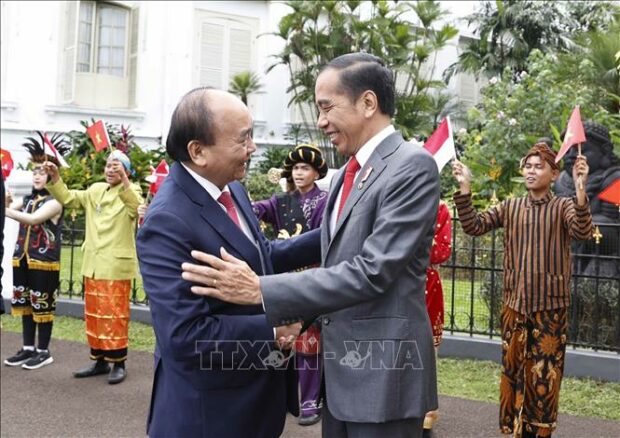
……………
Indonesia and Vietnam enhance relations in the post COVID-19 era
Vietnamese President Nguyen Xuan Phuc pays a State visit to Indonesia from December 21 to 23 at the invitation of Indonesian President Joko Widodo. The visit is expected to mark a new important milestone that contributes to promote the unique and traditional relationship between the two countries.
Since Vietnam and Indonesia established diplomatic relations on December 1955, the bilateral traditional friendship have been built on the firm foundation laid by President Ho Chi Minh and President Sukarno and developed by generations of leaders and peoples of the two countries. The establishment of the strategic partnership between Vietnam and Indonesia in 2013 is a milestone in bilateral relations, creating an opportunity for the two countries to continue promoting bilateral relations to develop and deepen in all fields, especially in politics, economy, culture, education-training, and defence.
Despite the difficulties brought by the COVID-19 pandemic, Vietnam-Indonesia trade relations have developed rapidly and hit 11.4 billion USD, up 40% year-on-year and exceeding the 10 billion USD goal set by the two in their action program for conducting their strategic partnership for 2019-2023. Vietnam is currently one of Indonesia’s largest trading partners. Meanwhile, Indonesia was Vietnam’s 12th largest trading partner in 2021. Recently, the two countries set a target to increase bilateral trade turnover to 15 billion USD by 2028 and there is great potential to achieve this goal.
The two governments agreed to expedite the finalisation of the Plan of Action for 2024-28 as a guidance for bilateral cooperation going forward to further solidify their partnership.
Indonesia and Vietnam also agreed to enhance the exchange of delegations and contacts at all levels, reduce barriers in trade and investment, signing at an early date of a Memorandum of Understanding (MoU) on bilateral rice cooperation for the next four years, remove obstacles to create favourable conditions for cooperation in fields of fisheries, high technology and digital economy.
Both countries are looking for partnership in areas like agriculture, fisheries, energy, aviation, culture, education-training, tourism and electric vehicle ecosystem.
In addition to bilateral agreements signed between Vietnam and Indonesia, the smooth signing of the historic Regional Comprehensive Economic Partnership (RCEP) during Vietnam’s ASEAN chairmanship in November 2020 in Hanoi is bringing more opportunities for the two countries to strengthen bilateral economic cooperation. The RCEP, the biggest free trade agreement in the Asia-Pacific, was signed by Indonesia, Vietnam, Thailand, the Philippines, Myanmar, Singapore, Brunei Darussalam, Malaysia, Cambodia, Laos, China, Japan, South Korea, Australia and New Zealand in 2020.
According to Veeramalla Anjaiah, a senior researcher at the Centre for Southeast Asian Studies (CSEAS) in Indonesia, during the visit, President Joko Widodo and President Nguyen Xuan Phuc are scheduled to discuss the entire gamut of bilateral relations, recovery from the
COVID-19 pandemic, the situation in the East Sea and several other regional as well as international issues.
The two leaders will not only review the strategic partnership between the countries, which will be 10 years-old next year, but also discuss ways and mechanics to boost bilateral trade and expand cooperation in many fields. Beside, investment opportunities in both countries and ways to promote people-to-people links through tourism are among the topics that will be discussed by the two leaders.
They may also discuss the progress of bilateral negotiations about exclusive economic zone (EEZ) boundary and Indonesia’s 2023 ASEAN Chairmanship, Veeramalla Anjaiah said. As key players in the ASEAN region, Vietnam and Indonesia have similar perceptions about achieving a common goal of ASEAN community and maintaining peace and security in the region, especially in the South China Sea (SCS).
Indonesia is not a claimant state in the SCS like Vietnam, but the two countries have similar opinions about the South China Sea (SCS), the United Nations Convention on the Law of the Sea (UNCLOS) 1982, ASEAN unity and the Code of Conduct (COC) in the SCS. Both Vietnam and Indonesia fully agree that all maritime disputes in the SCS must be resolved through peaceful negotiations and based on international laws, mainly UNCLOS.
The COC must be legally binding and based on the UNCLOS.
หมายเหตุ
รายงานโดย พันธมิตรไทยพับลิก้าในเวียดนาม เนื่องในโอกาสที่ประธานาธิบดีเหวียน ซวน ฟุก และคณะผู้แทนระดับสูงแห่งเวียดนามเยือนอินโดนีเซียอย่างเป็นทางการระหว่างวันที่ 21-23 ธันวาคม 2565 ตามคำเชิญของประธานาธิบดีโจโก วิโดโดแห่งอินโดนีเซีย
Reported by Thaipublica’s associates in Vietnam. President Nguyen Xuan Phuc and a high-ranking delegation of Vietnam pays a three-day state visit to Indonesia at the invitation of Indonesian President Joko Widodo.
